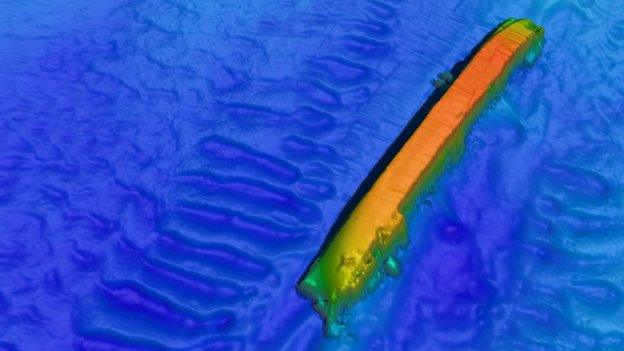WW1 U-boat propeller 'stolen from wreck' returned to Germany
- Published
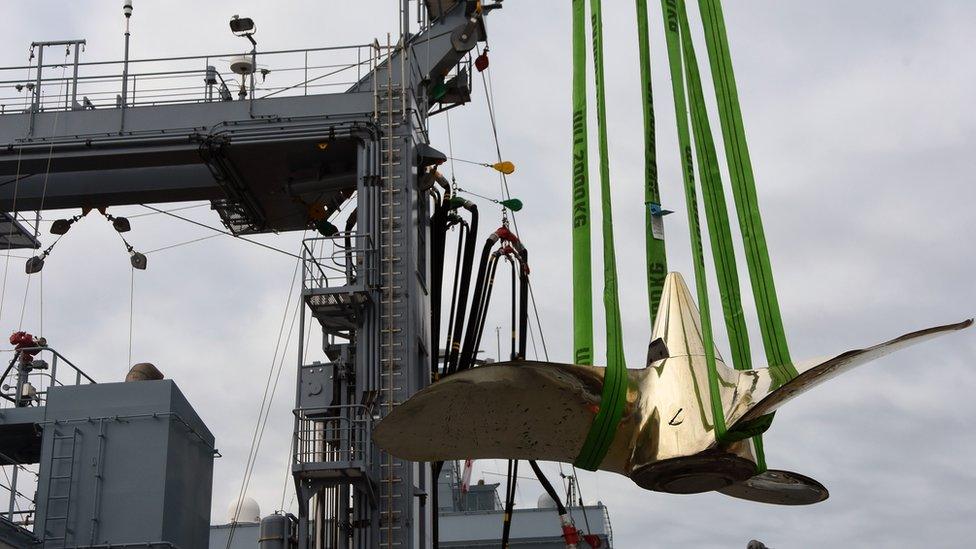
The propeller from U-boat UC-75 was loaded onto a German Navy ship FGS Bonn for its return
A stolen propeller from a World War One U-boat is being returned to Germany after being recovered in Wales.
The submarine UC-75 was responsible for sinking 56 merchant ships and two warships before it went down in the North Sea in 1918.
But propellers from the vessel were found in a storage unit in Bangor, Gwynedd, a year ago.
It is thought the items were illegally taken from the U-boat wreck by a diver off the east Yorkshire coast.
One of the propellers has been handed back to the German Navy in Plymouth, while the other will go on display at the Royal Navy Museum in Portsmouth.
"These propellers tell a story of bitter conflict and human loss, but also of bravery, selflessness and love," said Vice Admiral Sir Alan Massey, the chief executive of the Maritime and Coastguard Agency.
"It is fitting that they will now serve to remind citizens in both our countries of the realities of war and the personal sacrifices that inevitably follow."
The coastguard worked with North Wales Police and Historic England to ensure the pair of propellers from the U-boat were conserved.
It took students and instructor Paul Stevens at Southampton's College of Marine Skills over 50 hours to clean the propellers, after lying in the sea off Flamborough Head for almost a century.

Destroyers under the waves
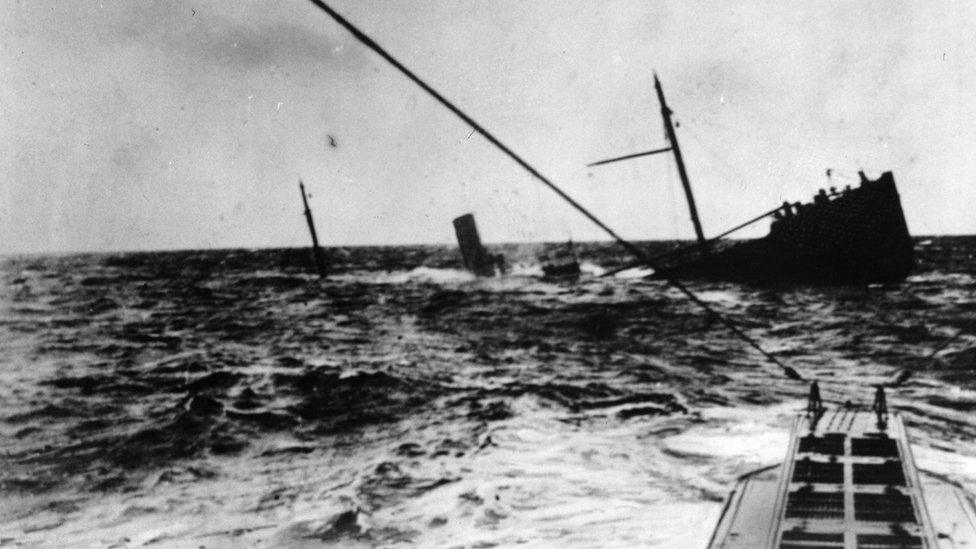
A German U-boat surfaces after sinking a British merchant ship in the North Sea in 1916
Built and launched in 1916, the U-boat UC-75 was a coastal mine layer that carried seven torpedoes and could dive to a depth of 50m (164ft).
It carried a crew of 26 men, and made 13 patrols against allied forces.
During that time, it was responsible for sinking 56 merchant vessels, amounting to 82,864 tonnes of shipping, and also two warships - though its final victim HMS Fairy - was also responsible for ramming the sub and ultimately sinking it off the Yorkshire coast on 31 May, 1918.
The U-boat sank with the loss of 17 lives, and 14 survivors.
The vessel was responsible for sinking the Liverpool-based coal cargo steamer SS Eskmere 15-miles off Anglesey's South Stack in October 1917.
Twenty lives were lost, including the ship's master Nathaniel Wicklen, from Cardiff, and two teenagers from Barry, one a 15-year-old steward.
The ship was sunk in five minutes and the crew had evacuated onto two lifeboats but both capsized. Men trapped underneath could be heard knocking but the then-U-boat captain Johannes Lohs refused to help. Seven were rescued the next morning.

The coastguard agency said it also highlighted the importance of historic wrecks around Britain.
"It's not a case of 'finders' keepers' and all recoveries of wreck material must be reported to the Receiver of Wreck so that legal owners can be given an opportunity of having their property returned and museums and other institutions can be given an opportunity to acquire artefacts of historic significance," added the agency's receiver of wrecks, Alison Kentuck.
Police in North Wales came across the items, believed to be destined for the scrap metal trade, after a raid on a property on Anglesey, and then in Bangor.
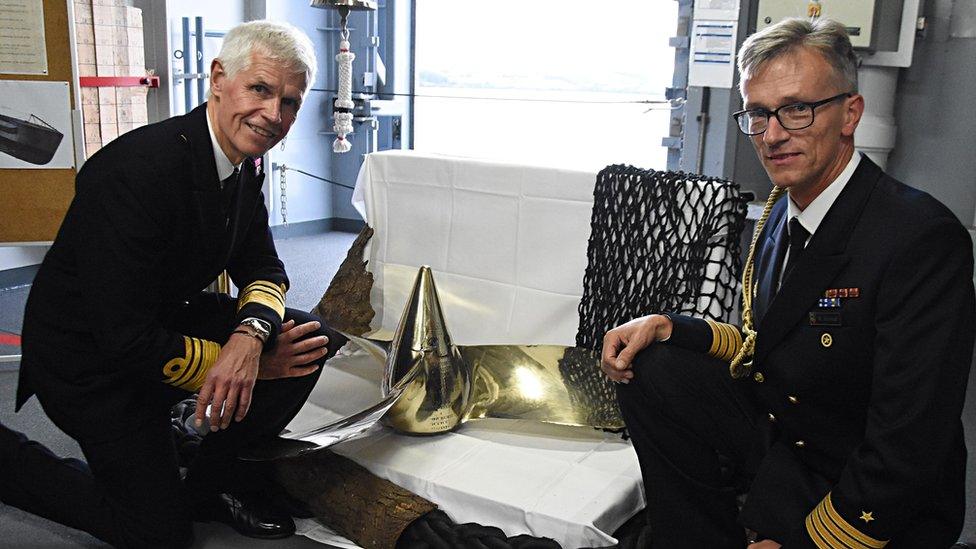
The propeller was handed to German Naval Attache Cpt Matthias Schmidt by the Maritime and Coastguard Agency's chief executive, Vice Admiral Sir Alan Massey
It led to one man receiving a formal caution over the find.
In November, two services will be held in the UK and in Germany to honour those who died during the conflict.
Captain Matthias Schmidt, German Naval Attache said: "The propeller witnessed the struggle for life 100 years ago. It will come home. It will be officially handed over to the Naval Museum in Laboe on the occasion of Armstice Day in November.
"The story of UC-75 is ending in a message of reconciliation and hope - the fruit of the close partnership between our two nations that has brought us together here today."
- Published7 June 2017
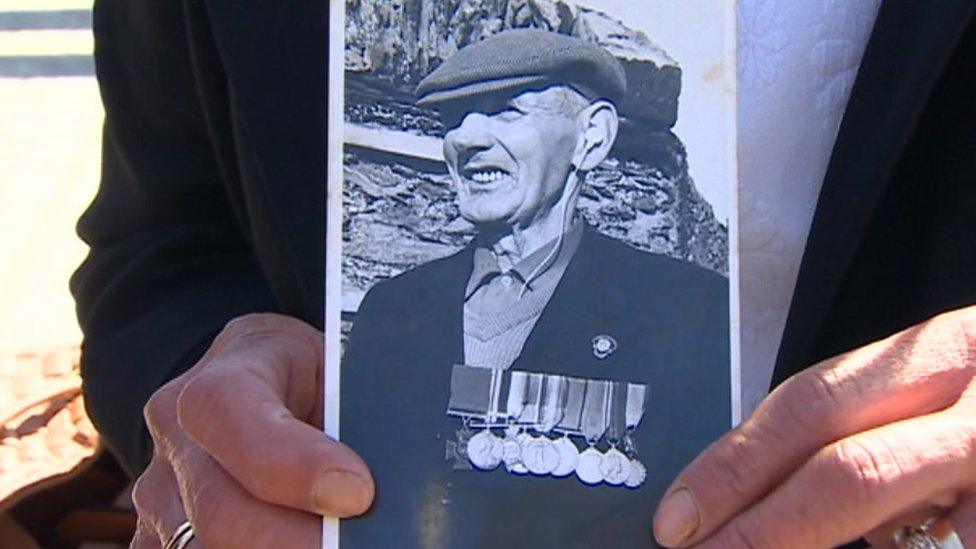
- Published3 March 2014
